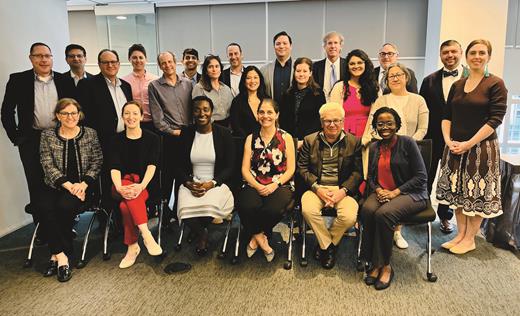Following its May business meeting in Washington, DC, the ASH Committee on Practice visited 35 congressional offices representing 19 different states. Committee members urged lawmakers to support legislation that would provide access to comprehensive, high-quality outpatient care for individuals with sickle cell disease (SCD) who are insured through Medicaid, including recommended clinical, mental health, ancillary, and support services.
John Burke, MD, vice chair of the ASH Committee on Practice, greets Fiona, the “pawlicy advisor” for Rep Diana DeGette (D-CO).
John Burke, MD, vice chair of the ASH Committee on Practice, greets Fiona, the “pawlicy advisor” for Rep Diana DeGette (D-CO).
Members of the ASH Committee on Practice met at ASH headquarters in May for a meeting before heading to Capitol Hill to visit with lawmakers.
Members of the ASH Committee on Practice met at ASH headquarters in May for a meeting before heading to Capitol Hill to visit with lawmakers.
The ASH advocates also strongly encouraged House and Senate offices to pass comprehensive legislation to prevent drug shortages and protect patient access to standard-of-care therapies. Additionally, they called for the passage of comprehensive Medicare physician payment reform before the end of the year to end the ongoing cycle of physician payment cuts.
Such “Hill Day” meetings are an important component of ASH’s advocacy efforts, providing an opportunity for members of Congress and their staff to learn about issues of concern to hematologists, including SCD and hematology practice and patient care. ASH members can amplify the Society’s message by visiting the ASH Advocacy Center and joining the ASH Grassroots Network. Contact ASH Senior Manager of Legislative Advocacy Tracy Roades at troades@hematology.org or visit hematology.org/advocacy for additional information.
CMS Expands Coverage for Hematopoietic Stem Cell Transplantation for Myelodysplastic Syndromes
This past spring, ASH joined the American Society for Transplantation and Cellular Therapy (ASTCT) and the National Marrow Donor Program (NMDP) in sending a letter to all Medicare Advisory Carrier (MAC) medical directors. “We want to alert you that your area of jurisdiction may be experiencing an influx of [hematopoietic stem cell transplantation (HSCT)] cases” that had been covered under a previous Centers for Medicare & Medicaid Services (CMS) policy, the letter notes. Further, the letter highlights the fact that the MACs now have the discretion to cover HSCT for MDS cases under the new National Coverage Determination (NCD) that was released and took immediate effect on March 6, 2024. The new NCD finalizes three important changes to existing coverage. First, CMS will now cover the use of umbilical cord blood stem cells in addition to already covered bone marrow and peripheral blood stem cell products. Second, the NCD details the use of additional risk designations and scoring systems. Finally, for MDS patients on Medicare, CMS removed the coverage with evidence development requirement for HSCT.
Medicare Proposed Rule Includes New Coding for Duffy Phenotype
In a major policy win for ASH, the fiscal year (FY) 2025 Medicare Inpatient Prospective Payment System (IPPS) proposed rule creates new clinical modification (CM) codes to describe Duffy phenotype status. CMS released the proposed rule in mid-April, with ASH member Maureen Achebe, MD, MPH, subsequently participating in a public meeting to advocate on behalf of the Society for inclusion of Duffy phenotype codes in the International Classification of Diseases, Tenth Revision (ICD-10-CM). The codes will be available for use beginning October 1, 2024.
CMS lists new ICD-10-CM codes in the tables released with the IPPS proposed rule. Table 6A includes four codes to capture Duffy phenotype status:
Z67.A1: Duffy Null
Z76.A2: Duffy a positive
Z76.A3: Duffy b positive
Z76.A4: Duffy a and b positive
ASH and Hematology Need Your Voice
Members of Congress routinely make decisions that profoundly affect hematology research and practice. ASH is the leader in representing the interests of scientists and clinicians working in hematology, both on Capitol Hill and within federal agencies. The Society educates lawmakers and government staff on critical issues such as funding for the National Institutes of Health; SCD research, training, and services; patient access to safe, effective, and affordable prescription drugs and therapies; and physician reimbursement.
ASH needs its members to advance these priorities. To learn how you can help, visit the ASH Advocacy Center at hematology.org/advocacy. The center provides updates on ASH’s policy and action, and it describes how you can reach out to elected officials to drive positive change.


